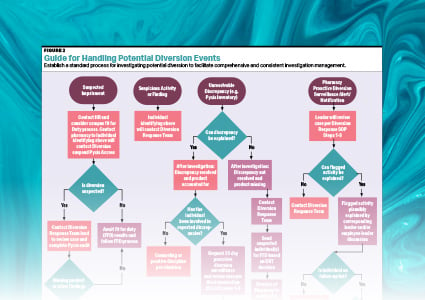- Show Menu
- Contact Us
- FAQs
- Reader Service
- Survey Data
- Survey Winners
- Testimonials
- Upcoming Events
- Webinars
- White Papers
Job Description for a USP <800> Designated Person
With the December 1, 2019 deadline for USP <800> compliance rapidly approaching, health care workers in facilities across the country are laboring diligently to ensure compliance. Many entities are focusing their time and effort on facility renovations, policy and procedure (P&P) updates, and implementing practices that support the chapter’s goal of promoting safety by limiting occupational exposure to hazardous drugs (HDs). One section of the chapter that has not been extensively discussed, but warrants attention, is Section 4: Responsibilities of Personnel Handling Hazardous Drugs, which describes the role of an entity-designated individual who is tasked with overseeing all aspects of HD handling.1
The chapter states:
Each entity must have a designated person who is qualified and trained to be responsible for developing and implementing appropriate procedures; overseeing entity compliance with this chapter and other applicable laws, regulations, and standards; ensuring competency of personnel; and ensuring environmental control of the storage and compounding areas. The designated person must thoroughly understand the rationale for risk-prevention policies, risks to themselves and others, risks of non-compliance that may compromise safety, and the responsibility to report potentially hazardous situations to the management team. The designated person must also be responsible for the oversight of monitoring the facility and maintaining reports of testing/sampling performed in facilities, and acting on the results.
Thus, to ensure USP <800> compliance, organizations should designate a specific individual to fulfill the designated person role to ensure all personnel who handle HDs do so safely, and to prevent patient harm and minimize personnel HD exposure and contamination of the work and patient-care environment.
Selecting a USP <800> Designated Person
The chapter does not specify who should be chosen as the USP <800> designated person; organizations may consider assigning a lead pharmacy technician, pharmacist, manager, or director to be the designated person on record. At a minimum, the selected candidate should have relevant experience in drug preparation, dispensing, sterile compounding, and inventory control, preferably with HDs. Based on the individual’s current expertise, institutions may choose to require additional experience, training, and certification, in alignment with their internal standards. For example, to be eligible for the designated person role, a lead technician could be required to obtain Compounded Sterile Preparation Technician (CSPT) Certification from the Pharmacy Technician Certification Board,2 or a pharmacist may be required to obtain Board of Pharmacy Services certification as a Board Certified Sterile Compounding Pharmacist (BCSCP).3 (See PP&P’s December 2018 article about the BCSCP certification at pppmag.com/article/2330.) Regardless of who is chosen as the designated person, didactic and hands-on training should be made available to this individual.
Job Responsibilities
The purpose of assigning a USP <800> designated person is to ensure a specific individual assumes responsibilities for comprehensive management of an organization’s USP <800> compliance plan. As the USP <800> expert, the designated person’s duties include standard operating procedure (SOP) development, personnel competency oversight, and conducting facility and environmental testing compliance.
Developing SOPs
The USP <800> designated person should be actively involved in SOP development, as well as subsequent training, implementation, and assessment for all pharmacy personnel. Additionally, this individual should collaborate with other health care professionals, including nursing and environmental services, during the SOP development process as the requirements for USP <800> extend beyond the pharmacy department.
Personnel Competency
Ensuring the competency of all personnel handling HDs is another key responsibility of the USP <800> designated person. To begin, staff must be educated regarding the rationale behind USP <800> regulations and the risks to themselves and others resulting from noncompliance with procedures designed to promote staff safety.
Section 9: Personnel Training of USP <800> outlines the minimum training requirements for health care workers who handle HDs.1 Methods to ensure competency include the following:
- Routine didactic testing on USP <800> requirements
- Practical assessments of:
- Personal protective equipment (PPE) use
- Proper use of equipment and devices, including engineering controls
- Appropriate HD handling, storage, transport, waste, and spill management procedures
Facility Monitoring and Environmental Testing
The USP <800> designated person bears certain responsibilities related to facility monitoring and environmental testing. These responsibilities include ensuring:
- Routine certification of the primary engineering controls and secondary engineering controls
- Routine microbial monitoring, as required by USP <797>
- Oversight of all daily and monthly cleanings
- Performance of routine surface wipe studies in areas where HDs are handled
The designated person should develop a process for ensuring appropriate daily, monthly, biannual, and annual personnel and facility testing occurs, and must ensure that all reports are complete, organized, and stored in a way that is readily accessible during regulatory surveys. Additionally, the designated person is responsible for building action plans that delineate how excursions or positive test results from environmental monitoring will be handled.
USP <800> Content Expert
The role of the USP <800> designated person should be recognized facility-wide; staff in all departments should view the designated person as the content expert for USP <800>. As such, the individual should lead local operational team huddles to disseminate HD information to frontline staff. The designated person should also attend routine meetings with leaders outside of the pharmacy department, including nursing and environmental services, to address interdepartmental questions and concerns. If there is an official forum for entity policy development, the designated person should be actively involved in the creation and routine review of all policies involving HDs.
Another critical function of the USP <800> designated person is as the point person fielding HD-related questions during Joint Commission or state board of pharmacy visits. In this role, the ability to effectively speak to USP <800> regulatory requirements and internal SOPs and P&Ps is crucial. Success in this role will be defined by minimal findings upon inspection and employees at every level who can speak to the rationale for standard HD compounding practices designed to promote staff safety.
Develop a Job Description
For organizations that have yet to appoint a USP <800> designated person to manage compliance, developing a job description that elucidates the unique qualifications and knowledge required for success in this position is a necessary first step. The FIGURE comprises a sample job description that outlines key responsibilities and required skills for this role. Responsibilities include ensuring compliance with USP <800> and other applicable laws, regulations, and standards. Any candidate for this position should demonstrate regulatory expertise that encompasses USP <800> as well as USP <795>, USP <797>, and state board of pharmacy rules, in addition to the entity’s internal policies. In order to ensure organizational compliance, the designated person must remain up-to-date with ongoing regulatory changes through continuing education and professional engagement with area experts.
Conclusion
Assigning an individual as the USP <800> designated person to oversee all aspects of HD handling is a USP <800> requirement. Although considerations for who takes on this responsibility may be site-specific, the key responsibilities that form the foundation of this position include becoming the USP <800> requirement expert, developing SOPs/P&Ps and ensuring staff competency, and overseeing facility monitoring and environmental testing.
Given the encroaching deadline, prompt identification of the facility’s designated person will help ensure that the organization is well positioned to meet the December 1, 2019 deadline for compliance with all of the USP <800> requirements.
References
- USP <800> Hazardous Drugs – Handling in Healthcare Settings. First Supplement to USP 39-NF 34 Physical Tests. www.usp.org/compounding/general-chapter-hazardous-drugs-handling-healthcare. Accessed October 17, 2018.
- Pharmacy Technician Certification Board. Become a PTCB Certified Compounded Sterile Preparation Technician (CSPT)! www.ptcb.org/get-certified/cspt#.XC-wgfy1uqA. Accessed January 4, 2019.
- Board of Pharmacy Specialties. Compounded Sterile Preparations Pharmacy. www.bpsweb.org/bps-specialties/compounded-sterile-preparations-pharmacy/. Accessed January 4, 2019.
 Suzanne J. Francart, PharmD, BCPS, is the pharmacy clinical manager for infusion services and the medication assistance program at the University of North Carolina (UNC) Medical Center. She earned her Doctor of Pharmacy from the Virginia Commonwealth University School of Pharmacy, then completed a PGY1 general practice residency and PGY2 pharmacotherapy specialty residency at UNC Hospitals. Suzanne’s professional interests include ensuring patient drug access and institutional financial stewardship.
Suzanne J. Francart, PharmD, BCPS, is the pharmacy clinical manager for infusion services and the medication assistance program at the University of North Carolina (UNC) Medical Center. She earned her Doctor of Pharmacy from the Virginia Commonwealth University School of Pharmacy, then completed a PGY1 general practice residency and PGY2 pharmacotherapy specialty residency at UNC Hospitals. Suzanne’s professional interests include ensuring patient drug access and institutional financial stewardship.
 Lindsey B. Amerine, PharmD, MS, BCPS, is the director of pharmacy at the UNC Medical Center. She is an associate professor of clinical education for the division of practice advancement and clinical education at the UNC Eshelman School of Pharmacy in Chapel Hill, North Carolina. Lindsey earned her Doctor of Pharmacy from the University of Wyoming School of Pharmacy and her MS with an emphasis in health-system pharmacy administration from the UNC Eshelman School of Pharmacy while completing a 2-year health system pharmacy administration residency at UNC Hospitals.
Lindsey B. Amerine, PharmD, MS, BCPS, is the director of pharmacy at the UNC Medical Center. She is an associate professor of clinical education for the division of practice advancement and clinical education at the UNC Eshelman School of Pharmacy in Chapel Hill, North Carolina. Lindsey earned her Doctor of Pharmacy from the University of Wyoming School of Pharmacy and her MS with an emphasis in health-system pharmacy administration from the UNC Eshelman School of Pharmacy while completing a 2-year health system pharmacy administration residency at UNC Hospitals.
FIGURE
USP <800> Designated Person Job Description
To ensure USP <800> compliance, organizations should designate a specific individual to fulfill the designated person role to ensure all personnel who handle HDs do so safely, and to prevent patient harm and minimize personnel HD exposure and contamination of the work and patient-care environment.
POSITION INFORMATION
Position: USP <800> Designated Person for Hazardous Drug Handling
Company: [Insert company name]
REPORTING RELATIONSHIPS
The USP <800> Designated Person will report directly to the entity operational manager or director.
KEY RESPONSIBILITIES
The USP <800> Designated Person will:
- Ensure compliance with USP <800> and other applicable laws, regulations, and standards
- Ensure personnel competency
- Ensure environmental control of the storage and compounding areas
- Develop and implement appropriate standard operating procedures for risk prevention
- Communicate risks that may compromise safety as well as the rationale for prevention policies
- Oversee facility monitoring
- Maintain reports of environmental testing and wipe sampling performed
- Develop and implement action plans responding to environmental testing and wipe sampling results
- Report potentially hazardous situations to the management team
- Remain current as to the requirements for USP <800> compliance and other applicable laws, regulations, and standards
- Collaborate with other health care professionals to provide training regarding risks to themselves and others resulting from non-compliance
- Utilize internally developed systems and/or commercial vendor software to track personnel competency and maintain records of facility monitoring
- Participate in regulatory agency inspections of the compounding facility
REQUIRED SKILLS AND ATTRIBUTES
The USP <800> Designated Person should demonstrate strength in the following skills:
- Communication
- Leadership
- Attention to detail
- Organization
- Time management
REQUIRED EXPERIENCE
- The USP <800> Designated Person must have experience is defined as experience in a hospital or compounding pharmacy setting encompassing drug preparation, dispensing, sterile product compounding, and inventory control, preferably in hazardous drug preparation, storage, and handling
Like what you've read? Please log in or create a free account to enjoy more of what www.pppmag.com has to offer.








